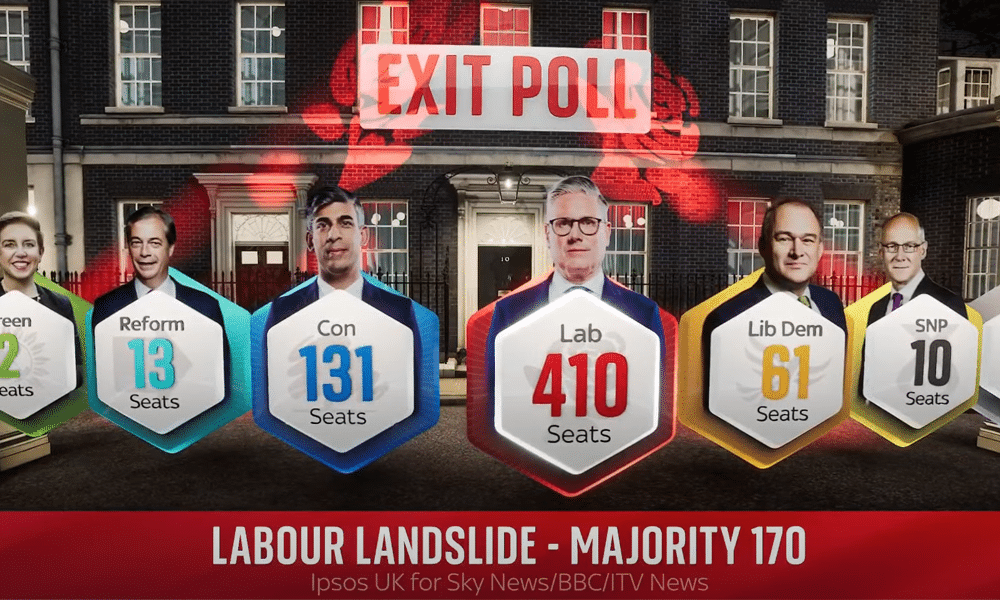United Kingdom: Labour has achieved a landslide victory in the general election, ending 14 years of Conservative rule, according to an exit poll by Ipsos UK for Sky News, BBC, and ITV News.
Sir Keir Starmer’s party is projected to secure 410 seats, giving them an overall majority of 170.
In stark contrast, the Conservatives are expected to win just 131 seats, a significant drop from the 365 seats they held after the 2019 election. This could mark the lowest number of seats for the party in its history.
The Liberal Democrats are forecasted to win 61 seats, the Scottish National Party (SNP) 10, Reform UK 13, Plaid Cymru 4, and the Greens 2.
The results indicate a significant shift in voter sentiment, with Labour’s “time for change” message resonating strongly after years of Conservative-led chaos and division, including the Brexit fallout, the handling of the COVID-19 pandemic, and the Partygate scandal.
Keir Starmer’s Labour Party has more than doubled its seats from the 2019 election, while the Conservatives face their worst performance ever.
The SNP has also suffered, losing more than 30 seats.
Reform UK, a hard-right party, appears to have gained traction, securing 13 seats and potentially impacting both Conservative and Labour seats. Nigel Farage is expected to win the Clacton seat on his eighth attempt to enter Parliament.
Senior Conservative figures, including Chancellor Jeremy Hunt, Defence Secretary Grant Shapps, and Veterans Minister Johnny Mercer, are predicted to lose their seats. The first results of the night showed the Conservatives being pushed into third place by Reform UK.
Labour’s deputy leader, Angela Rayner, called the exit poll result “encouraging” but cautioned that final numbers were still pending. She praised Sir Keir Starmer for transforming the Labour Party and presenting a government programme that resonated with the public.
Former Conservative justice secretary Sir Robert Buckland acknowledged the likely defeat and emphasized the need for the party to learn from it. He cited the cumulative events leading to the rejection of the Conservatives, drawing parallels to the 1997 defeat.
The exit poll suggests Labour will achieve a landslide victory, though possibly falling short of the 179-seat majority Tony Blair won in 1997.
However, they may achieve this on a smaller share of the vote than what Jeremy Corbyn secured in 2017.
The Liberal Democrats are projected to win five times more seats than in 2019, with leader Sir Ed Davey attributing the success to their positive campaign focused on health and care.
SNP leader John Swinney, despite the projected loss, expressed confidence in Scotland’s rejection of the Tory government, highlighting the party’s positive campaign.
Reform UK leader Nigel Farage is expected to win in Clacton, with the party projected to secure 13 seats.
To form a majority government in the Commons, a party needs at least 326 seats. The Conservatives appear to have suffered in areas with high mortgage rates, likely due to the impact of Liz Truss’s “fiscal event.”
The Liberal Democrats performed well in former Conservative seats, particularly those held until 2015. Prime Minister Rishi Sunak struggled to make headway in a campaign marred by mishaps and communication blunders, including a controversial visit to Belfast’s Titanic Quarter and a premature departure from D-Day commemorations.
The campaign was further complicated by revelations that some of Sunak’s closest aides and several Conservatives had placed bets on the election timing, leading to an investigation by the Gambling Commission.
As the final results come in, Labour’s anticipated landslide victory marks a significant shift in the UK’s political landscape, ending over a decade of Conservative dominance.

